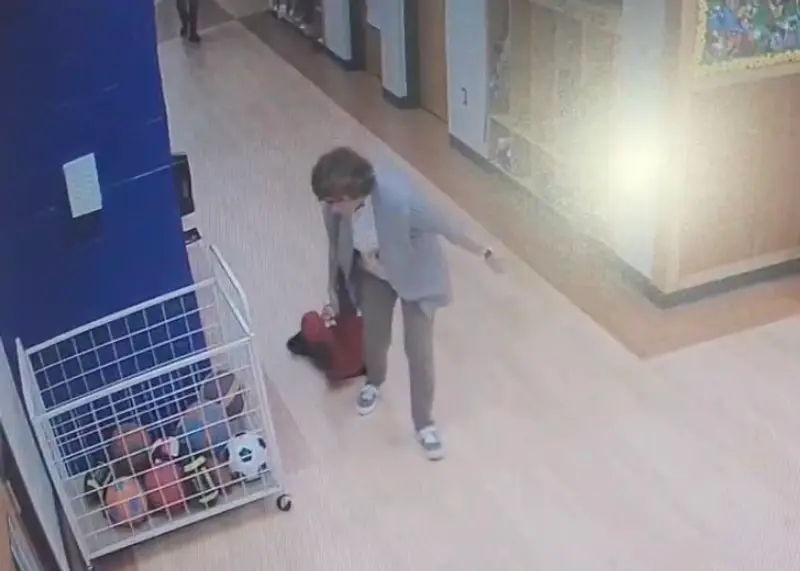A short video taken inside an Illinois school captured troubling behavior: A teacher gripping a 6-year-old boy with autism by the ankle and dragging him down the hallway on his back.
The early-April incident would’ve been upsetting in any school, but it happened at the Garrison School, part of a special education district where at one time students were arrested at the highest rate of any district in the country. The teacher was charged with battery weeks later after pressure from the student’s parents.
It’s been about eight months since the U.S. Department of Education directed Garrison to change the way it responded to the behavior of students with disabilities. The department said it would monitor the Four Rivers Special Education District, which operates Garrison, following a ProPublica and Chicago Tribune investigation in 2022 that found the school frequently involved police and used controversial disciplinary methods.
But the department’s Office for Civil Rights regional office in Chicago, which was responsible for Illinois and five other states, was one of seven abolished by President Donald Trump’s administration in March; the offices were closed and their entire staff was fired.
The future of oversight at Four Rivers, in west-central Illinois, is now uncertain. There’s no record of any communication from the Education Department to the district since Trump took office, and his administration has terminated an antidiscrimination agreement with at least one school district, in South Dakota.
In the April incident, Xander Reed, who has autism and does not speak, did not stop playing with blocks and go to P.E. when he was told to, according to a police report. Xander then “became agitated and fell to the ground,” the report said. When he refused to get up, a substitute teacher, Rhea Drake, dragged him to the gym.
Another staff member took a photo and alerted school leadership. Principal Amy Haarmann told police that Drake’s actions “were not an acceptable practice at the school,” the police report said.
Xander’s family asked to press charges. Drake, who had been working in Xander’s classroom for more than a month, was charged about three weeks later with misdemeanor battery, records show. She has pleaded not guilty. Her attorney told ProPublica that he and Drake did not want to comment for this story.
Tracey Fair, the district’s director, said school officials made sure students were safe following the incident and that Drake won’t be returning to the district. She declined to comment further about the incident, but said school officials take their “obligation to keep students and staff safe very seriously.”
Doug Thompson, chief of police in Jacksonville, where the school is located, said he could not discuss the case.

Credit:
Obtained by ProPublica
Xander’s mother, Amanda, said her son is fearful about going to Garrison, where she said he also has been punished by being put in a school “crisis room,” a small space where students are taken when staff feel they misbehave or need time alone. “He has not wanted to go to school,” she said. “We want him to get an education. We want him to be with other kids.”
Four Rivers serves an eight-county area, and students at Garrison range from kindergartners through high schoolers. About 70 students were enrolled at the start of the school year. Districts who feel they aren’t able to educate a student in neighborhood schools send them to Four Rivers; Xander travels 40 minutes each way to attend Garrison.
The federal scrutiny of Garrison began after ProPublica and the Tribune revealed that during a five-year period, school employees called police to report student misbehavior every other school day, on average. Police made more than 100 arrests of students as young as 9 during that period. They were handcuffed and taken to the police station for being disruptive or disobedient; if they’d physically lashed out at staff, they often were charged with felony aggravated battery.

Credit:
Bryan Birks for ProPublica
The news organizations also found that Garrison employees frequently removed students from their classrooms and sent them to crisis rooms when the students were upset, disobedient or aggressive.
The Office for Civil Rights’ findings echoed those of the news investigation. It determined that Garrison routinely sent students to police for noncriminal conduct that could have been related to their disabilities — something prohibited by federal law.
The district was to report its progress in making changes to the OCR by last December, which it appears to have done, according to documents ProPublica obtained through a public records request.
But the records show the OCR has not communicated with the district since then and it’s not clear what will come of the work at Four Rivers. The OCR has terminated at least one agreement it entered into last year — a deal with a South Dakota school district that had agreed to take steps to end discrimination against its Native American students. Spokespeople for the Education Department did not respond to questions from ProPublica.
Scott Reed, 6-year-old Xander Reed’s father, said he and Xander’s mother were aware of the frequent use of police as disciplinarians at Four Rivers and of OCR’s involvement. But they reluctantly enrolled him this school year because they were told there were no other options.
“You can say you’ve made all these changes, but you haven’t,” Scott Reed said. For example, he said, even after confirming that Drake had dragged the 50-pound boy down the hall, school leadership sent her home. “They did not call police until I arrived at school and demanded it” hours later, he said.
“If that was a student” that acted that way, “they would have been in handcuffs.”


Credit:
Bryan Birks for ProPublica
New ProPublica reporting has found that since school began in August, police have been called to the school at least 30 times in response to student behavior.
Thompson, the police chief, told ProPublica that, in one instance, officers were summoned because a student was saying “inappropriate things.” They also were called last month after a report that a student punched and bit staff members. The officers “helped to calm the student,” according to the local newspaper’s police blotter.
And police have continued to arrest Garrison students. There have been six arrests of students for property damage or aggravated battery this school year, police data shows. A 15-year-old girl was arrested for spitting in a staff member’s face, and a 10-year-old boy was arrested after being accused of hitting an employee. There were at least nine student arrests last school year, according to police data.
Thompson said four students between the ages of 10 and 16 have been arrested this school year on the more serious aggravated battery charge; one of the students was arrested three times. He said he thinks police calls to Garrison are inevitable, but that school staff are now handling more student behavioral concerns without reaching out to police.
“I feel like now the calls for service are more geared toward they have done what they can and they now need help,” Thompson said. “They have attempted to de-escalate themselves and the student is not cooperating still or it is out of their control and they need more assistance.”
Police were called to the school last week to deal with “a disturbance involving a student,” according to the police blotter in Jacksonville’s local newspaper. It didn’t end in an arrest this time; a parent arrived and “made the student obey staff members.”

